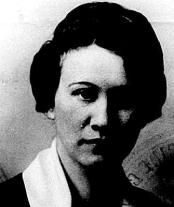
Margaret Rowland, from her 1918 passport application
“I knew the world was crashing over my head.”
— Margaret Rowland, 1918
Margaret Elizabeth Rowland was born in Phillips, WI, in 1892, the daughter of attorney, insurance executive, and Racine County public administrator John D. Rowland. She graduated from the University of Wisconsin–Madison in 1913 and attended a nursing course in New York. Rowland headed overseas in April 1918 to take up Red Cross work.
She was assigned to a French evacuation hospital as a nurse’s aide. An excerpt from a letter she wrote to her brother, David, was published in the 26 Aug. 1918 Racine Journal News:
You see all of the wounds when they come in . . . they are huge gouges just filled with livid, bright, green matter and are the vilest smelling things. The men are so brave, not only the Frenchmen but the Americans too. . . . .
Tuesday morning at 3 o’clock the train came in with four hundred poor wounded things. We all got up and flew to our places, I in the operating room, and there we worked until 12 o’clock that day. . . . .
We started again at 4 o’clock and worked until 8 that night. We fell into bed awfully tired expecting to get some sleep. I did go to sleep when suddenly I sat up in bed with the queerest of sensations. It was horrible. I knew the world was crashing over my head. Everything was shaking like a leaf and the most horrible roar rung in our ears. Then out of all the chaos I heard “burr-burr-burr” of a German plane and I knew we were being bombed.
It is an awful sensation. You know you are in danger and yet you really are not afraid. You become a perfect fatalist. . . . Three bombs dropped within half a block of us.
. . . . I heard my name shouted outside of my door to dress immediately and go to the operating room—another train had come in. Well, we worked again without any food until 12 o’clock that noon—cutting great hunks of shrapnel out, sawing out pieces of fractured bone, amputating, sewing up ghastly looking face wounds and trying to fix up some absolutely fatal cases as comfortably as possible so the poor fellows could die in peace. . . . .
We had to stop for a few hours while the Boche flew over us and dropped a few bombs. . . .[T]heir bombs dropped on their own men, on a prison camp of Boche, a few kilometers from here. They killed about 110 and wounded a good many. The French are really awfully good to them and take care of the poor fellows but it must be sort of a shock to be bombed by your own people. (23)
Later, Rowland served with the Red Cross Motor Corps in Paris.
After a six-week courtship, she married John Bradley Washington Delehanty in Paris in April 1919 (see the wedding invitation at the National World War I Museum and this account of the wedding in Stars and Stripes). Delehanty’s sister Frances, an artist and occupational aide with the Red Cross, was in attendance. Bradley Delehanty, a descendant of George Washington’s brother Samuel and an architect, was a captain and operations officer in the AEF’s 308th Infantry who played a role in the relief of the famous “Lost Battalion.”
The couple lived in New York and had two children. Cornell student John Bradley Delehanty Jr. (1922–40) died in a car accident. Patricia Delehanty Hildt (1920–77) became an artist. Rowland passed away in 1962. One grandchild, John Bradley Hildt, served in the Peace Corps in Uganda, and another, Anne Hildt Geddes, is an interior designer.